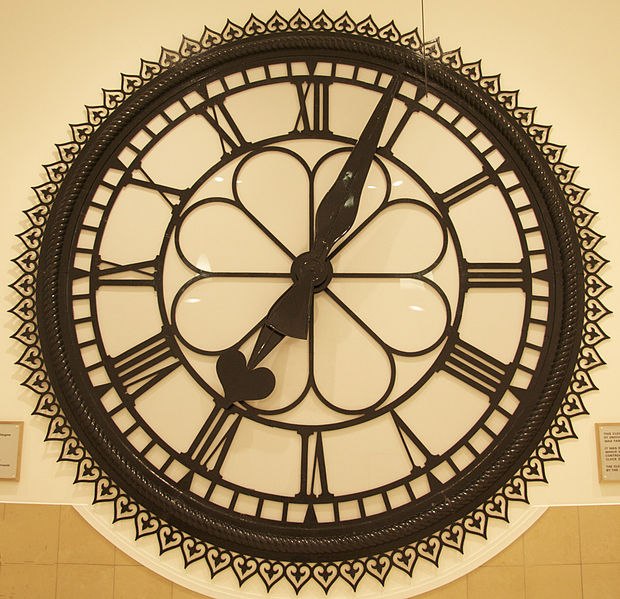Daniel Gray continues his exploration of life in Cumbernauld past, present and future. Here, he finds out what signs and symbols hold meaning for local residents, and gets an insight into what they feel is lacked and what is loved in the town.
A city overspills

Beyond the plastic cones is the clock. It came from St Enoch Station, following the many Glasgow exports who made Cumbernauld home. They were The Overspillers, children and their parents bound for the spaces of this New Town, freed from the confines and crowds of the city. By the clock would they meet – old pals for a pint in the Golden Eagle Hotel, nervous girls and boys ready for a night at the pictures, and who knows…
Ah, the pictures. So often do the pictures come up in these golden sessions. Films seen and remembered and cherished, versus the town’s lack of a cinema now. Each time I ask – whether after those present have workshop-planned their own town, or in other conversations – ‘what would you build now to make this a better place?’, the word ‘cinema’ comes up. ‘Something for the young ones to do’ is said in conjunction. This is a generation that always thinks of others.
It is impossible to see the clock. The cones block the stairs at whose peak it hangs, grand and giant if the photographs, or Gregory’s Girl, are anything to go by. The centre of Cumbernauld has many of these non-places, these blocked-off voids. In this one, they tell me, there was supposed to be a new cinema. Then there are the abandoned penthouse apartments – ‘they used to be the best cooncil flats in the world’, as one man put it.
But I am learning this: don’t be tricked by what isn’t here. Be awake to what is.
Whether a place is a thousand years old or fifty, its people are its beating heart. Very often, when I ask ‘what comes to mind when I say ‘Cumbernauld’ to you?’ there are answers like ‘my grandson, running about in the park’, and ‘my pals, making me laugh.’
When you are from a town like this, when you recognise its faults but get prickly if an outsider points them out, you know that a part of you belongs to the place. And hidden within what that outsider sees, is a meaning or memory for the local; the nights out in the pubs now demolished, the dates by the disappeared clock. They are what anchor people to place.
“I remember the day we moved here,” said one woman to me, her face trickling with glee. “I thought it was heaven. We’d hardly seen fields before. Me and my brother, we got hold of a wooden door and sailed it down the stream. It’s changed. We’ve changed. But I wouldn’t want to stay anywhere else.”
Over the coming weeks, I’ll be listening some more, and visiting the places those people tell me about, some still existing, some gone. We’ll talk about the past – memories of arriving here, of school, work, leisure. We’ll talk about the ties which bind now – home, family, friends, church, pub. We’ll talk about the future – things that could improve the town, from cinemas and bus stations to wild flowers and licks of paint. Every town is a moving tapestry, and Cumbernauld’s is intriguing.
Share this Post
